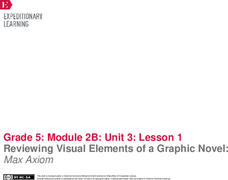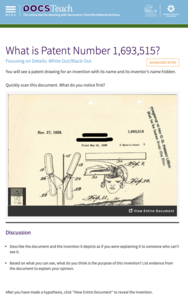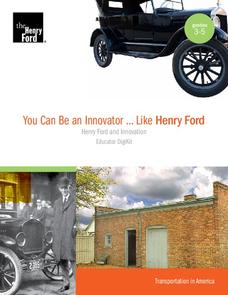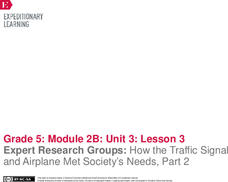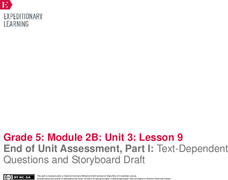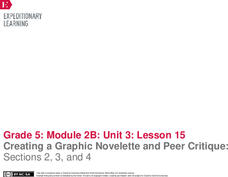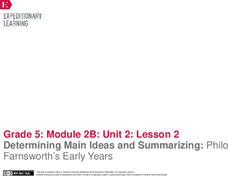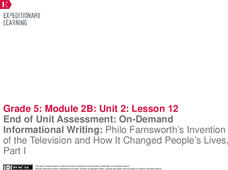New Jersey Historical Commission and New Jersey Council for the Humanities
Thomas Edison: The Wizard of Menlo Park
What would change in your daily life due to a power outage? Here, learners explore the inventions brought to us by the one and only, Thomas Edison, and imagine a day without them. Scholars take part in a grand conversation and write a...
EngageNY
Reviewing Visual Elements of a Graphic Novel: Max Axiom
Pass the tea! Using the resource, scholars participate in a Tea Party protocol to analyze text and images about inventions that helped meet societal demands. After sharing their observations with each other, they discuss visual elements...
EngageNY
End of Unit Assessment, Part II: Storyboard Draft, Sections 2 and 3
It's time to demonstrate knowledge. With the instructive resource, pupils complete the second part of the end of unit assessment. They develop sections two and three of their storyboards about an invention, add visual elements, and then...
EngageNY
End of Unit Assessment, Part III: Storyboard Draft, Section 4
Reflection is the best teacher. Using the resource, scholars complete the final part of their end of unit assessment, the fourth section of their storyboard about an invention. Next, they track their progress using a self-reflection form.
National Council of Teachers of English
Timelines and Texts: Motivating Students to Read Nonfiction
With the emphasis on incorporating more nonfiction in language arts classes the question arises about how to design activities that motivate kids to engage with informational text. How about an assignment that asks class members to...
DocsTeach
What is Patent Number 1,693,515?
Scholars examine a document from 1928 featuring a mystery invention. Following their observations and discussion, the document reveals the invention of the permanent wave machine by Marjorie S. Joyner. Class members read about Joyner,...
Scholastic
Frindle Lesson Plan
"Who says a pen has to be called a pen? Why not call it a frindle?" Inspired by this quote from the award-winning novel written by Andrew Celements, this lesson allows children to invent their own terms for common classroom objects,...
Henry Ford Museum
You Can Be an Innovator ... Like Henry Ford
Why did Henry Ford want to invent a car for the masses? Why did Henry Ford locate his factory in Detroit? Why did Henry Ford encourage the idea of a 5-day work week? Young innovators find the answers to these and other question in a unit...
EngageNY
Expert Research Groups: How the Traffic Signal and Airplane Met Society’s Needs, Part 2
Ready, set, act! Using the fun resource, pupils patriciate in a vocabulary charades activity to practice key terms from the unit. Next, scholars work in expert research groups to read an article about the invention of the traffic signal...
EngageNY
Mid-Unit Assessment: On-Demand Note-taking and Text-Dependent Questions
Flex those brain muscles! Scholars take a mid-unit assessment, conducting research to take notes about how a particular invention helped meet society's needs. To complete the test, they work on draft sketches for their graphic novelettes.
EngageNY
End of Unit Assessment, Part 1: Text-Dependent Questions and Storyboard Draft: “You Can Do a Graphic Novel” Excerpt
Eyes on the finish line. Serving as the first part of the end of unit assessment, learners answer questions based on a text about how to write a graphic novel. Using what they've learned, they then create a storyboard about the invention...
EngageNY
Creating a Graphic Novelette and Peer Critique: Sections 2, 3, and 4
Let's get creative! With the fun resource, pupils continue working on their graphic novelettes about an invention, adding text and images to each section. When finished, they engage in a peer critique process, giving and receiving...
PBS
Thomas Edison: Inventor and Entrepreneur
How many of Thomas Edison's inventions do your scholars use every day? They might be shocked to find out! Young historians watch a video, analyze a photograph, and read one of Edison's letters to learn more about his life and impact....
PBS
Alexander Graham Bell: Scientist, Inventor, and Teacher
Hello? Hello? Scholars investigate the impact Alexander Graham Bell's telephone had on the American landscape. Using drawings, video clips, and primary sources, the mind of the inventor comes to light as pupils dream of new inventions to...
EngageNY
Determining Main Ideas and Summarizing: Philo Farnsworth’s Early Years
Teamwork makes the dream work! Learners work in groups to analyze pages 2-9 of The Boy Who Invented TV, The Story of Philo Farnsworth. They complete a first read to determine the gist and a second read to identify main idea and provide a...
EngageNY
End of Unit Assessment: On-Demand Informational Writing: Philo Farnsworth’s Invention of the Television and How It Changed People’s Lives, Part I
On-demand isn't just for TV anymore. Writers complete their end of the unit assessment with an on-demand writing task. They read the article Television and answer questions about the gist, vocabulary, and content. They then complete a...
EngageNY
End of Unit On-Demand Informational Writing: Philo Farnsworth’s Invention of the Television and How It Changed People’s Lives, Part 2
Scholars complete the unit by finishing their end of the unit assessments. They arrange sentences for an introductory paragraph in the correct order, provide evidence for their thinking, and write a conclusion paragraph. They then...
Scholastic
Spin-a-Story: Writing Prompts Chart
"But I don't know what to write about!" Now, there's a very familiar complaint. And here's a very creative solution. Young authors are given a writing prompt chart, spin three wheels that provide suggestions for the who, what, and where...
American Institute of Physics
African American Inventors in History
A two-part lesson plan introduces young historians to the work of famous African American inventors. Groups first research and develop a presentation of an inventor that includes biographical information and information about one of...
K12 Reader
Ben Franklin
Readers are asked to use the provided graphic organizer to list the main idea and supporting ideas in a passage about the inventions of Benjamin Franklin.
Council for Economic Education
The Neolithic Agricultural Revolution
What effect could one person's invention have on the human race? In the case of the Neolithic Agricultural Revolution, small improvements in farming methods led to increased food production. The human population began to boom, leading us...
Overcoming Obstacles
Problem Solving on the Job
The truth is there are consequences for actions. The third lesson plan in the "Problem Solving Module" asks class members to brainstorm a list of problems, select one and invent a system, process, or object that might solve the problem....
Institute of Electrical and Electronics Engineers
Stop and Go
It's "Green light, go!" with this lesson! STEM classes are illuminated with the history of traffic signals and how the engineering design has improved over time. They also learn about patents for new inventions. Finally, they research in...
Smarter Balanced
How We Learn
What's the best way to learn the elements of the periodic table? The inventions of Thomas Edison? Patience? To prepare for the performance task assessment on how people learn, class members share ideas about ways to learn in a variety of...
Other popular searches
- Renaissance Inventions
- Civil War Inventions
- Ancient Chinese Inventions
- Inventors and Inventions
- Chinese Inventions
- 19th Century Inventions
- Inventors Inventions
- Innovations and Inventions
- Science Inventions
- Rocket Inventions
- Leonardo Da Vinci Inventions
- Technological Inventions



